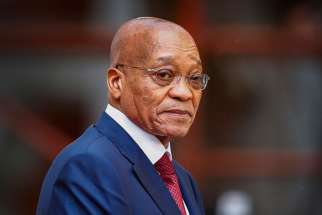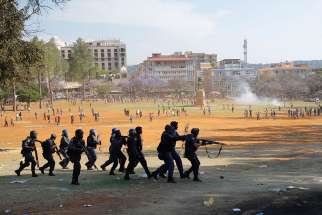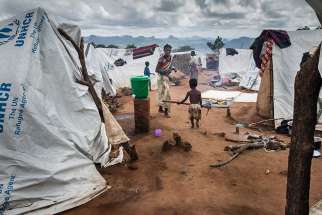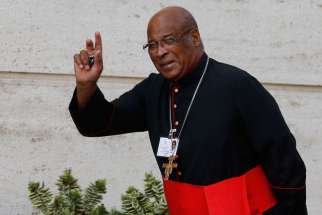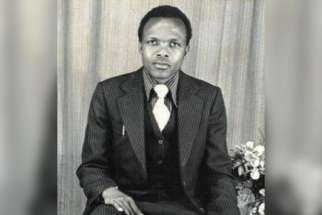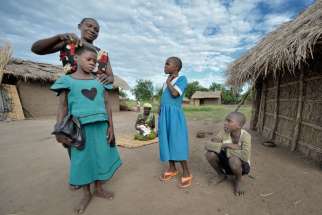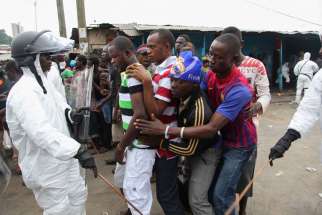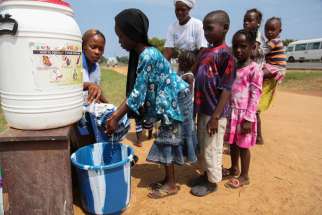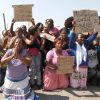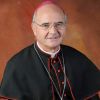CAPE TOWN, South Africa - A prominent South African Jesuit called for President Jacob Zuma to resign after a court ruling that he violated the constitution in the $16-million remodeling his home.
CAPE TOWN, South Africa - Violence and vandalism at South African universities are reactions to inequality in the country, said Archbishop William Slattery of Pretoria, spokesman for the Southern African Catholic Bishops' Conference.
Disease, cold add to suffering of Mozambicans who fled to Malawi
CAPE TOWN, South Africa - Malaria and cold nights add to the suffering of the increasing number of Mozambicans arriving at a makeshift camp in Malawi to escape violence at home, said a church worker in Malawi.
VATICAN CITY - Greater emphasis on small-group discussions and incorporating that work into the Synod's final draft document is helping alleviate any suspicion of the Synod being manipulated, said one of the four Synod presidents.
Church beatifies South African teacher killed for resisting witchcraft
CAPE TOWN, South Africa - South African Benedict Daswa, who was bludgeoned to death 25 years ago for resisting witchcraft, now has the title of blessed.
Southern Africa: AIDS has left families headed by kids, grandparents
CAPE TOWN, South Africa - With the highest levels of HIV prevalence globally, southern African countries have seen families torn apart by AIDS, with children left to raise younger siblings and sick children left in the care of elderly grandparents.
CAPE TOWN, South Africa - Hunger and panic are spreading among people unable to work because of restrictions aimed at containing the spread of Ebola in Liberia and Sierra Leone, say church workers in West Africa.
Liberian health system suffers from strain of Ebola
CAPE TOWN, South Africa - Liberia's health system is in "complete shambles," a Church aid agency said, as the death of a Spanish priest brought to six the number of caregivers at a Catholic-run hospital in the capital of Monrovia who have died of Ebola in August.
South African bishops call for inquiry into mine violence
CAPE TOWN, South Africa - South Africa's bishops condemned the killings at a platinum mine in Marikana and called for a judicial inquiry into the circumstances that led to the violence.
Thirty-four people died and 78 were injured Aug. 16 when police opened fire on striking miners who, armed with machetes and homemade spears, were gathered on a rocky outcrop at the mine, 100 km northwest of Johannesburg. Another 10 people, including two policemen, had already been killed in violence at the mine since the start of an illegal strike Aug. 10.
"The senseless loss of life, especially through wanton violence, is always a tragedy and needs to be condemned in the strongest terms," the Southern African Catholic Bishops' Conference said in a statement.
"There are a lot of questions and not many answers," Bishop Kevin Dowling of Rustenburg said in a telephone interview. The mine is located in his diocese.
He and other Church leaders were aware of the standoff between two trade unions over recognition agreements at the mine and "hoped that it would be resolved in the negotiations during the week," Dowling said. The miners were also demanding higher wages.
The actions of the trade unions, the London-based Lonmin mining company and the police "need to be investigated" by an inquiry that also looks at "the living and working conditions at this mining operation," the bishops said.
"We offer to assist in the trauma counselling and community healing that will be necessary for this community and the broader South African community," the bishops said.
"We cannot allow this violence to escalate and become a normal part of our society.
"There are effective mechanisms available for facilitating and brokering amicable settlements to disputes of whatever nature, and we encourage all the parties concerned in this tragic situation to commit to acquiring these skills to ensure that similar unfortunate incidences do not occur again," they said.
Dowling said that often South Africa's industrial disputes turn violent, which "indicates deep frustration and anger."
"Terrible poverty and high levels of unemployment" in his diocese "are the cause of much tension," he said.
The secretary-general of the South African Council of Churches, the Rev. Mautji Pataki, said that he and the organization's president, Anglican Bishop Johannes Seoka of Pretoria, found workers and management at the mine "willing to engage one another, provided the level of hostility is reduced to allow peaceful interaction and resolution."
A delegation from the council, of which the Southern African Catholic Bishops' Conference is a member, visited the mine Aug. 17 and said in a statement afterward that the council would "seek to help to create an atmosphere conducive to negotiation."
The council called on the police "to exercise restraint in the use of force as they seek to maintain law and order." It said it is "only through meaningful and peaceful dialogue that all parties affected by this conflict can find a solution."
South African President Jacob Zuma cut short a visit to a regional summit in neighbouring Mozambique to visit the mine.
In a front-page editorial Aug. 17, the Sowetan newspaper said that in South Africa, 18 years after the end of apartheid, "the value of human life, especially that of the African, continues to be meaningless." Africans "are pitted against each other over who is the rightful representative of workers. They are also fighting for a bigger slice of the mineral wealth of their own country. In the end the war claims the very poor African — again," the newspaper said.
South Africa is home to 80 per cent of the world's known reserves of platinum. Rising power and labour costs and a steep decline this year in platinum prices have left many mines struggling to stay afloat, according to Reuters, the British news agency.
Bill protecting state secrets bad for South Africa, says archbishop
CAPE TOWN, South Africa - South Africa's bill on protecting state secrets could turn the country into a security state, said Cape Town Archbishop Stephen Brislin.
The Protection of State Information Bill, which allows any government agency to apply for classification of information that is "valuable" to the state and criminalizes the possession and distribution of state secrets, "does not serve the interests of the nation and can be used to damage our democracy," Archbishop Brislin said in a Jan. 19 statement.


